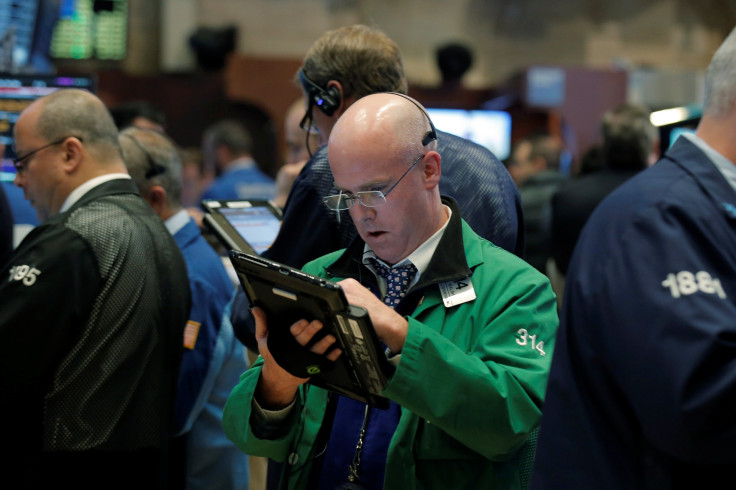Dow Jones Industrial Average Slides As Brexit Worries Push Global Stock Markets Lower

This story was updated at 4:20 p.m. EDT.
Safe-haven German Bund yields fell below zero on Tuesday for the first time and global equity markets slid for a fourth day running on rising worries about a British exit from the European Union.
Polls and bookmakers' odds showed a growing chance that the Brexit vote will prevail in the June 23 referendum. Britain's largest tabloid newspaper, the Sun, also came out for the "Leave" side.
The 10-year Bund yield fell as low as minus 0.032 percent, which effectively means investors are paying to lend money to the German government for a full decade.
U.S. Treasury yields fell to four-month lows on Brexit fears as investors scaled back their lingering expectations that the Federal Reserve would raise interest rates in coming months. A two-day meeting of the Federal Open Market Committee is to begin Tuesday.
"The market is really afraid of the uncertainty of what the outcome will actually be," said Tony Bedikian, head of global markets at Citizens Bank in Boston, referring to Brexit.
Fed funds futures show investors see almost no chance of the Fed raising U.S. interest rates on Wednesday after the dismal U.S. payrolls report for May. The odds have drifted toward zero as polls have shown the increasing likelihood of a Brexit.
A British pullout would increase the risk to global growth and further weigh on the euro while strengthening the dollar, which would tighten financial conditions and likely prompt the Fed to reconsider rate hikes, said Jeffrey Kleintop, chief global investment strategist at Charles Schwab & Co. in Boston.
MSCI's all-country world stock index fell 1.2 percent while European shares fell for a fifth straight session. The pan-European FTSEurofirst 300 index closed down 1.89 percent at 1,260.14, a three-month low.
On Wall Street, the Dow Jones Industrial Average was down 57 points, or 0.3 percent, at 17,675 by the close of trading, having lost over 100 points earlier in the session. The Standard & Poor's 500 slid 4 points, or 0.2 percent, to 2,075, and the Nasdaq composite ended down 5 points, or 0.1 percent, at 4,844.
Oil prices fell for a fourth straight day, swept lower by investor skittishness over Brexit. The referendum overshadowed signs of a return to health for crude markets after the International Energy Agency said the oil market is essentially balanced after two years of surpluses.
Brent crude oil futures closed 52 cents lower at $49.83 a barrel, while U.S. crude ended the session 39 cents down at $48.49. Gasoline futures touched a more than one-month low of $1.50 a gallon during the session.
"Even as both OPEC and the International Energy Agency talk about a tighter oil market, fear of the fallout from a U.K. exit from the euro zone is throwing global markets into a tizzy," said Phil Flynn, an analyst at Price Futures Group in Chicago.
The dollar has risen about 1.5 percent from its June lows against a basket of currencies, spurred by Brexit fears.
Volatility in the pound spiked to its highest in at least 20 years, rising beyond heights seen when Lehman Brothers collapsed in 2008. The yen surged to its strongest against the euro in more than three years.
The euro was down 1.06 percent against the yen at 118.71, while the dollar slid 0.23 percent to 105.99 yen.
The dollar trimmed losses against the yen slightly after a strong U.S. retail sales report for May, though the data did little to increase the odds of a Fed rate hike in the summer.
Reuters contributed to this story.
© Copyright IBTimes 2024. All rights reserved.





















